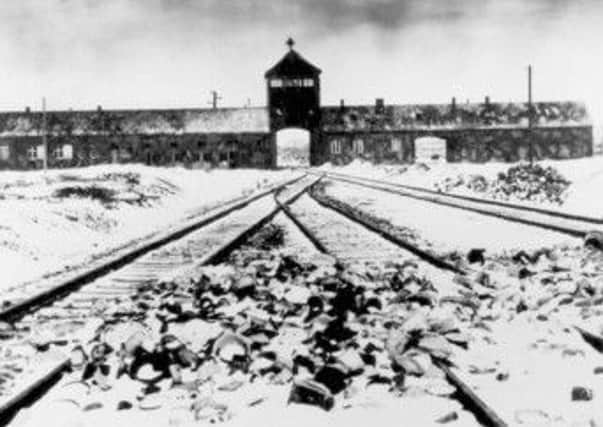Why the world must never forget the horrors of Auschwitz


SITTING in her comfortable London flat, Eva Schloss rolls up her sleeve to show me the concentration camp number A5272 coarsely tattooed on her arm.
The ink may have faded, but the scars of the horrors she and her family experienced at Auschwitz, the Nazis’ most notorious death camp during the Second World War, will remain with her forever.
Advertisement
Hide AdAdvertisement
Hide AdEva, an Austrian Jew, was a teenager when the Nazis invaded and she fled with her family to Amsterdam, where she became friendly with a young girl called Anne Frank, who would posthumously become famous for her diary, published after the war.
As the situation in Holland worsened, Eva and her family – mother Fritzi, father Erich and brother Heinz – moved from house to house for two years to evade capture, but were eventually betrayed by a Nazi sympathiser who took them in then gave them away. On Eva’s 15th birthday they were arrested, brutally interrogated and, in May, 1944, forced onto trains for Auschwitz. There, Eva and her mother were separated from her father and brother, and it was only after liberation that she learned both had perished.
Now, Eva has written After Auschwitz charting her family’s ordeals at the hands of the Nazis as well as her journey back to some semblance of normality. Looking back, she sees how incredibly lucky she was to survive the eight-month incarceration, which ended in January 1945 when they were liberated by Russian troops.
An estimated six million Jews died in the Holocaust and more than a million perished in the gas chambers of Auschwitz. On arrival, SS guards weeded out those too weak to work by encouraging the sick and infirm to board their trucks for a lift to the camp. The unsuspecting victims were driven straight to the gas chambers. Those who survived were starved and treated like rats by sadistic officers, living in fear that they would be ‘selected’ for the gas chambers.
Advertisement
Hide AdAdvertisement
Hide AdEva and her mother were sent to work in ‘Canada’, a vast area behind the camp where dead prisoners’ possessions were sorted and classified. There she found piles of thousands of pairs of spectacles, while other warehouses housed false legs and arms, thousands of shoes and suitcases and hundreds of empty prams. All plunder was to be sent back to Germany and distributed to soldiers and their families.
“Anne Frank wrote at the end of her diary, just before she was captured, that she still believed people were good at heart, but I wonder what she would have thought if she had survived the concentration camps at Auschwitz and Bergen-Belsen,” Eva writes. “My experiences revealed that people have a unique capacity for cruelty, brutality and sheer indifference to human suffering. It is easy to say that good and evil exist within each of us but I have seen the unedifying reality of that close at hand and it has led me to a lifetime of wondering about the human soul.”
Eva, 83, admits she has lost her faith in God. “I am disappointed with the human race. We learned at school that we are created in the image of God, but I say God isn’t supposed to be cruel. It’s something for which I’m still trying to find an answer.”
After the war Eva moved to England and became a photographer. Today, married with three children and a clutch of grandchildren, she devotes much of her life to speaking in schools and prisons, educating people on the perils of prejudice and intolerance, for which she was awarded an MBE last year.
Advertisement
Hide AdAdvertisement
Hide AdThe psychological scars from Auschwitz ran deep and for many years she became withdrawn, suffered nightmares and was unable to talk to people. It wasn’t until 1986 when she was asked to speak at the opening of the Anne Frank Travelling Exhibit in London, that she opened up about her experiences.
In 1995 she returned to Auschwitz to make a Dutch TV documentary. “It was as bad as I remembered it. There was snow and I was remembering that I had no shoes and how I was freezing. I look back and think, how could one survive that? We were just skin and bones but we survived.”
Has she forgiven the Nazis? “No,” she says firmly. “I have no qualms with the new generation of Germans, who have nothing to do with it, but the perpetrators? I can’t forgive them. In 20 years, none of the survivors will be here which is why it’s important that we educate people now. I always say to the youngsters, it will be for you to carry on the story.”
After Auschwitz, by Eva Schloss, is published by Hodder & Stoughton, out tomorrow, priced £20